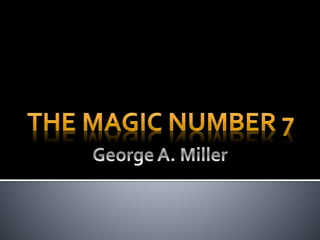
Magic Number 7
- 2. 1. American 2. February 3, 1920 - Charleston,WestVirginia 3. July 22, 2012 (aged 92) – Plainsboro, New Jersey a) Dementia b) Pneumonia 4. Cognitive psychology 5. Directing Word Net 6. “The Magical Number Seven, Plus or MinusTwo: Some Limits on Our Capacity for Processing Information” 1956
- 3. • the number of objects an average person can hold in working memory is about seven • amount of information we can retain is quite limited • we could only hold five to nine (seven plus or minus two) pieces of information in our working memories
- 4. • How much information can be accurately transmitted through the participant • Amount of information we can hold in the mind at one time
- 6. • the brain can only handle a limited amount of new information at a time • too much information or too many tasks to learners simultaneously, resulting in the learner being unable to process this information
- 8. 1. active component - conscious processing 2. It organizes information by integrating new information with the existing information 3. Temporarily stores information for the learner’s use 4. Has smaller capacity but its representations more durable 5. Capacity – limited for registering sensory input but nil when storing information 6. Very little storage capacity, and is easily overloaded if too many pieces of information are brought in at one time
- 9. 1. Repetition • NOTHING LASTS LONG in short-term memory • To remember, repeat it until it becomes part of long-term 2. Chunking • Regrouping items so that we have fewer to remember 3. Identifying Logical Patterns • Numbers presented at regular intervals or in sequence – that makes the information easy to control
- 10. 1. Warehouse of Knowledge or the data bank that stores information 2. Network of Neurons • helps us to integrate knowledge, organize it and use it 3. Repository of Stored information • permanent storage 4. Information • labeled as verbal or visual information for future use that contains episodic and semantic knowledge
- 11. 1. Association • as we go through the process of recalling information, we search for contextual factors that will help us associate with an event or a person 2. Categorization • information can be organized by categories 3. Mediation • during the encoding process, we must make meaningful units of information – this technique form a meaningful word association 4. Imagery • makes use of our sensory modalities in which we transform ideas into vivid images 5. Mnemonics • Combining initial letters to form words that is easier to recall • words , phrase, or sentence mnemonics
- 12. 1. Repression and Distortion • we sometimes give inaccurate information that contradicts our beliefs • One reason is our selective attention when we focus on things we choose to hear things or perceive 2. Retroactive Inhibition • When two bits of information we are trying to store are confusing, there is a backward interference of new learning from past 3. Primacy and Recency Effects • Primacy – learned recently • The information that is integrated first in our memory system has likelihood to be remembered easily
- 13. 1. Whole and Part Learning • Introducing the material as a whole student 2. Repetition and Drills • Use of relevant materials for practice, repetition, and drills • Help to retain information if they have the interest in it and is related to prior knowledge 3. Over learning and Automaticity • When the material is repeated with a purpose, it can lead to automaticity 4. Distributed Practice or Massed Practice • Learning little by little and those that come in chunks • Massed Practice – practice – relatively long and uninterrupted period • Distributed Practice – it can be spread over time
- 14. 1. Transience • Gradual forgetting of information over time • Old memories are less vivid than recent ones 2. Absent-Mindedness • Failure to fully attend to the actual encoding process 3. Blocking • Accounts our memory that is present but inaccessible, probably due to an inadequate or misleading cue 4. Misattribution • The idea that the memory is present but it is attributed to the incorrect source 5. Suggestibility • Incorrect information that is unknowingly incorporated into memory representations 6. Bias • When memory is distorted by our prior knowledge that is mingle with specific memory, there is bias already 7. Persistence • The memory that is highly intrusive or obsessive
